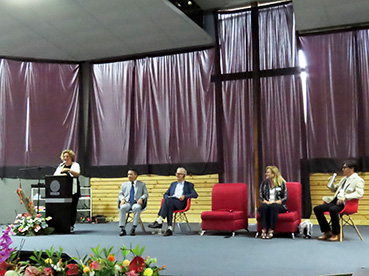Costa Rica hosted the 34th International Congress of CIRIEC on public, social and cooperative economy from October 16 to 18, the main meeting event for the CIRIEC institutional community, made up of agents of the public economy and the social economy, researchers and political decision-makers in twenty countries in Europe, America, Africa and Asia.
In a context of major challenges and uncertainties, derived from growing conflicts, inequalities and the climate emergency, the objective of the 34th Congress was to discuss issues related to the strategies and innovations implemented by the public economy and the social economy in this context, and their necessary transitions and transformations. Thus, actors from the social economy and the public economy showed their experiences and achievements for a more just and sustainable society.
The Congress was inaugurated by the acting vice-president of the Republic of Costa Rica, Stephan Brunner; accompanied by the rector of the Universidad Estatal a Distancia, Rodrigo Arias Camacho, president of CIRIEC-Costa Rica; Professor Federico Li, executive director of CIRIEC-Costa Rica, and Bernard Thiry, president of CIRIEC International.
Stephan Brunner expressed his honoured that Costa Rica was the venue for the 34th International Congress of CIRIEC, an event that, in his opinion, represents “a great opportunity to reaffirm our commitment to the social economy, a model that puts people at the center and seeks to improve the lives of everyone.” Brunner also assured that the Social Economy “is key to building a more equitable and inclusive future, where solidarity and cooperation are fundamental pillars for the sustainable development of our communities.”
For his part, rector Arias Camacho called for the mobilization of all sectors in all areas as a way of generating more balanced societies and oriented to closing the gaps in development. Arias Camacho stated: “At this particular historical moment in the 21st century, growing the social economy is not an end in itself, but a step towards improving living conditions for all people.”
Federico Li highlighted the dynamism of the young Costa Rican section of CIRIEC, which in just 3 years has managed to organize 2 international CIRIEC events, the first, in 2021, conference of researchers in social economy, and the second, held this October, of an institutional nature. Between the two events, it has managed to bring together more than a thousand participants who have visualized and valued the action of the social economy and its researchers in the face of the great challenges of our time: sustainability, the fight against inequalities, economic democracy and social inclusion.
In the same vein, the president of CIRIEC International, Bernard Thiry, welcomed this new CIRIEC meeting, as well as the growing activity of its members, as global interest in economic alternatives that put people and the planet at the centre of their activity grows.
Seven major challenges of the social economy
After the inaugural session of the Congress, the opening conference was held by Ilcheong Yi, senior research coordinator of the Alternative Economies for Transformation programme at the United Nations Research Institute for Social Development (UNRISD). In his speech, he detailed what he considers to be the seven major challenges of the social economy today, which can be summarised as: Integrating concepts and consolidating the theoretical framework of the social economy; Integrating the different families, sizes and organisations of the sector; Overcoming sectoral and organisational analyses and opening up the social economy to collaboration with other sectors and public administrations; Considering the SSE as part of a necessary economic plurality; Strengthening national and regional legislative frameworks; Promoting and safeguarding the values of the social economy based on economic democracy, and integrating technological and digital innovations together with social innovations in the SSE.
First public presentation of the report ‘Benchmarking the socio-economic performance of the EU social economy’
On Thursday 17 October, Professor Rafael Chaves made the first public presentation of the report ‘Benchmarking the socio-economic performance of the EU social economy’, which has just been published by the European Commission. The study was carried out jointly by EURICSE and CIRIEC, following a call for tenders issued by the Executive Agency for the European Innovation Council and SMEs (EISMEA). Nearly 50 experts from the 27 EU Member States participated in the research project.
According to its results, 4.3 million companies and organizations, 11.5 million paid employees and more than 912 billion euros in turnover are the main figures for the social economy in the European Union.
More than 50 speakers from around twenty countries took part in the Congress, including the Secretary of State for the Social Economy of the Spanish Government, Amparo Merino; Professor Thierry Pauchant, holder of the Chair in Ethical Management at the HEC Montreal Business School (Canada); Frederic Tiberghien, Honorary State Councilor (France), and Dr. Augusto Zampini-Davies.







